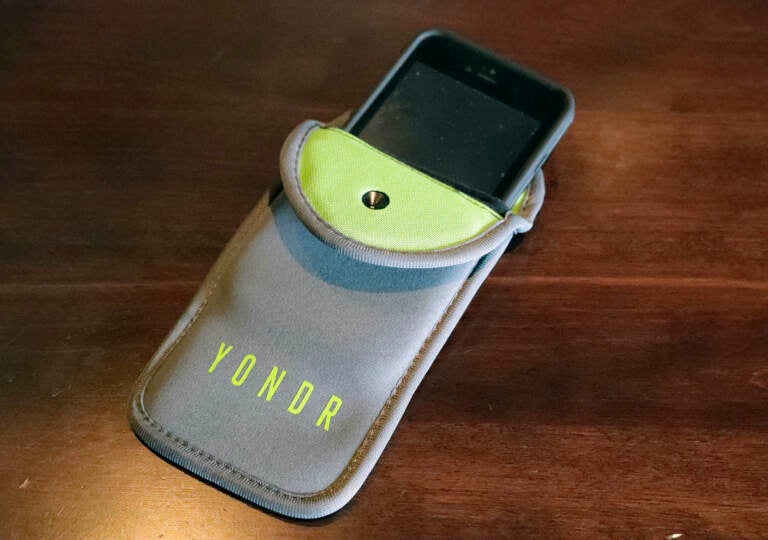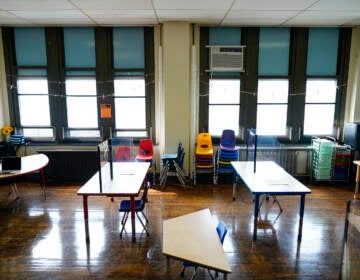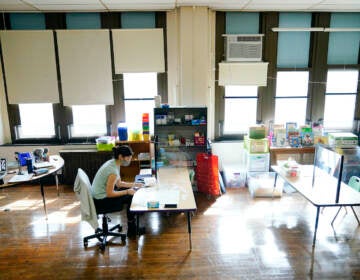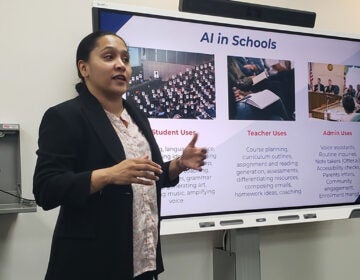Philly school district could spend $5 million to lock up student cell phones
Philly’s school board is considering a five-year contract to provide locking cell phone pouches to every district school that wants them.
Listen 1:07
Several Philadelphia schools currently have Yondr pouches for locking up students' cell phones during the day. District administrators are considering buying more. (AP Photo/John Raoux)
Update: Philadelphia’s school board did not vote on the proposed $5 million contract with Yondr Inc. Thursday night as planned. The board withdrew the item halfway through its meeting. Superintendent Tony Watlington said he plans to get more feedback from school principals.
In an attempt to create “phone-free schools,” the School District of Philadelphia wants to spend $5 million to lock up students’ phones, according to Thursday’s school board agenda.
The board is scheduled to vote on a five-year contract with Yondr Inc. to provide the company’s locking cell phone pouches to every district school that wants them, along with staff training and ongoing support.
“With a cell phone free environment, schools can increase engagement in the classroom so that there can be a substantial increase in student learning as evidenced by benchmarks, constructed responses, on-track percentages, and teacher assessments,” school board documents say.
The document goes on to say that the absence of cell phones during the day can reduce cyberbullying and the number of students who cut class by texting their friends to let them back into the building.
District spokesperson Marissa Orbanek declined to provide details about the contract, such as the number of pouches the district would get. She said schools will not be required to participate in the program if the contract is approved. If a school opts in, students with individualized education plans (IEPs) that allow for cell phone use would also be exempt.
The proposal immediately drew criticism from some teachers who objected to the $5 million price tag.
“I had really been hoping that with our new superintendent we would see less money spent on stuff and more money spent on people,” said Clarice Brazas, a teacher at Academy at Palumbo.
Brazas said she knows cell phones can cause problems in schools, but believes the money would be better spent on staff who can work with students to teach better self control.
What are Yondr pouches?
Yondr pouches have become common in recent years, not just in schools but at concerts, in museums, and even courthouses.
The San Francisco-based company began working with schools in 2014 and has worked with at least 900 schools since then, according to Yondr.
Students typically receive a pouch that they’re required to bring with them to school.
In the morning, each student places their phone in their pouch and pushes a button to lock it. They can then carry their phones without being able to use them. School staff unlock the pouches at the end of the day.
Some Philly schools already use Yondr pouches
Yondr pouches are already in use in the School District of Philadelphia.
Roughly 3,500 students use Yondr pouches, according to Assistant Superintendent Jonathan Brown, whose learning network covers a dozen high schools.
West Philadelphia High School started locking up students’ phones last year, joining Samuel S. Fels High School, which has been using Yondr pouches since before the pandemic. Both schools paid for the pouches with their discretionary funding.
At the two schools, Brown said, the pouches are about 90% effective. He said schools in his network that have tried to enforce no-cell phone policies without Yondr have had less success.
“They are still experiencing disruption with the presence of phones and they’re spending a great deal of energy to figure out how to get students to stop using them,” Brown said. “Short of securing them, we have not found strategies that are consistently successful.”
Another six schools in Brown’s network are trying the pouches for the first time this school year, including Dobbins Technical High School in Northeast Philly.
Students at Dobbins said cell phones are a big problem at their school. So far, they said the Yondr pouches don’t appear to be helping.
“It’s not hard to get phones out of the pouches,” said 11th-grader Synceir Thorton. “Some students break them or hide their phones.”
Taahzje Ellis, also an 11th-grader, said teachers told students the pouches would help prevent fights.
“A lot of the arrangements for a fight happen before they even get in the building,” Ellis said. “I don’t think taking away the phone is going to stop anything.”
While taking away phones may not prevent fights from happening completely, Brown said he does think it can help prevent them from spiraling out of control.
Brown said it’s also important to remember that policies take time to implement.
He said compliance has gotten better at Fels and West Philadelphia with time as students and parents have grown to appreciate or at least understand the policy.
“I’ve been thanked by multiple students for taking their phones,” Brown said. “Once people have had an opportunity to express their concern, they’ve responded positively to the why behind it.”
Are the Yondr pouches a good idea?
Taking away student choice is something that doesn’t sit well with some teachers or researchers, like Jason Chein, a professor of neuroscience at Temple University.
Chein doesn’t think requiring students to use Yondr pouches is a good idea.
“I think this is a very dangerous step to take in an environment with these unknowns and where really the science could support an argument in either direction,” he said.
Chein believes that having access to a cell phone can be beneficial for some students.
It might be wise to make the pouches optional, he said, since learning is best when it’s self-motivated.
“They can encourage that behavior, but allow the students to choose it for themselves,” he said.
Brown, the assistant superintendent, who helped the district pilot Yondr pouches said he knows they aren’t a cure-all.
“I think it’s really important to remember why we did this. This is about taking a step to increase student engagement,” Brown said. “It’s not the only thing we’re doing, but it’s a thing we’re doing and it’s been wildly successful, from my view, so far.”
WHYY is your source for fact-based, in-depth journalism and information. As a nonprofit organization, we rely on financial support from readers like you. Please give today.








